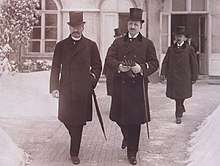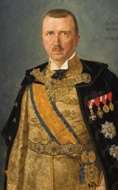Iván Skerlecz
Baron Iván Skerlecz de Lomnicza (original Croatian name: Ivan Škrlec Lomnički; 20 July 1873 – 12 January 1951) was a Croatian ban (viceroy) between 21 July, 1913, until 29 June, 1917.

Iván Skerlecz | |
|---|---|
 Iván Skerlecz portraited as Ban | |
| Ban of Croatia-Slavonia | |
| In office 21 July 1913 – 29 June 1917 | |
| Monarch | Franz Joseph I of Austria (until 1916) Charles I of Austria |
| Preceded by | Slavko Cuvaj |
| Succeeded by | Antun Mihalović |
| Personal details | |
| Born | 20 July 1873 Oroszló, Austria-Hungary |
| Died | 20 January 1951 (aged 77) Budapest, People's Republic of Hungary |
| Occupation | Politician |
Skerlecz was born into Šokci origin aristocratic family in Oroszló, Baranya County, Kingdom of Hungary in 1873.
The Skerlecz family had close friendship with the Tisza family, since Kálmán Tisza became prime minister of Hungary.
Ivan studied law in Pécs and Budapest. From 1896, at the age of 23, he served in the public service as a legal intern at the Prime Minister's Office. From 1911 he was appointed as ministerial adviser in the Prime Minister's Office.
The Hungarian prime minister István Tisza appointed Skerlecz head of the Austro-Hungarian crown land in 1913, shortly before World War I.
On August 18, 1913, shortly after his appointment as Ban of Croatia, Stjepan Dojčić attempted an assassination on Iván Skerlecz in Zagreb, however Skerlecz was only lightly injured on his right arm.
While Croatia-Slavonia was not the site of any battles, Croatian troops, fighting under the Croatian Home Guard took part in the fighting, much of it in neighbouring Serbia. Skerlecz managed to reconvene the Croatian Sabor (parliament) in Zagreb by 1915. The Croats made further demands for local authority, as well as unification of Croatia-Slavonia with Dalmatia and Bosnia and Herzegovina. Stjepan Sarkotić, Austria-Hungary's commander in Bosnia and Herzegovina also sought unification of their provinces. However, Austria-Hungary's outdated political system made any shifts between areas under Hungarian or Austrian spheres of influence difficult. Skerlecz could only support the Croatians in acting autonomously. As the war progressed more Croats found the formation of a South Slav state a potentially beneficial possibility.
He resigned from his post on June 29, 1917 after his friend PM István Tisza was ousted from power, leaving the country in no better state than when he had arrived. The Kingdom of Serbs, Croats and Slovenes was formed the following year. Skerlecz became persona non grata in Kingdom of Yugoslavia, because he was known as an ardent opponent of the involvement of Croatia in the newly formed Kingdom of Yugoslavia. Skerlecz had to move to Hungary. Thereafter he lived in his family villa at Andrássy Avenue. He died in Budapest in 1951.
Sources
- "Škrlec, Ivan". Croatian Encyclopedia (in Croatian). Retrieved 24 July 2015.